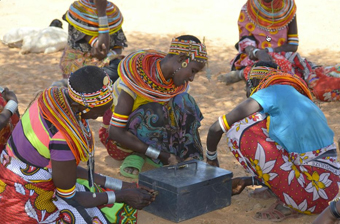
How do we hold our programs accountable?
What happens after a program receives funds? How do we know how the program is using our funds and whether it is doing the work as promised?
We have three different kinds of reports, and the timing is based on whether the program is receiving a 1 year, 2 year or 3 year grant:
- Featured programs with one-year grants must submit an interim report at six months and the final report at the end of 12 months.
- Featured programs with a two-year grant are required to submit a contact report via email at six and 18 months. Full interim reports are required at one year, and the final report must be submitted at the end of 24 months.
- Sustained Programs that receive grants over a three-year period are required to submit contact reports at 6, 18 and 30 months. Full interim reports are required at the one and two year marks, and final reports are required at the end of 36 months.
Timing of Reports
The timing of these reports is based on when the program receives its grant check. For instance, a program that was featured in January 2015 would have received its check in April 2015 because our programs remain open for three months and we would have collected donations until the end of March. This program is then required to submit its interim report by October 2015 (six months after the check has been issued), and a final report would be due in March 2016 – one year after the grant is paid.
DFW is committed to making these reports available to members in a timely manner, however, the submission of reports is sometimes delayed. Our programs are often dealing with challenges in the field that may include war, natural disasters, or disease outbreaks that can delay the timing of the actual projects or reporting. When these delays occur, our programs are always in close contact with DFW and adjustments are made as necessary.
What’s In a Report?
DFW provides specific guidelines to its programs for what should be included in reports. Generally speaking, interim and final reports must describe the use of the grant funds, compliance with the terms of the grant, and the progress made toward achieving the goals of the grant.
All interim and final reports are evaluated by DFW staff and are then posted on each program’s page on our website.
Due to past staff changes, DFW experienced a backlog of unposted reports, but we have recently cleared that backlog and have created systems to ensure that reports are available in a timely manner. All available reports for featured and sustained programs are now online for members to review. These reports provide a wealth of information on the results of DFW’s funding, and we encourage all members to review them. In order to make it easier for members to access the reports, we will list, in future issues of The Dish, all new reports posted on our website, along with the links to get to them quickly.
A Program Report Highlight
One of the most recent reports we have posted is from RAIN for the Sahel and Sahara, which was our featured program in July 2014. RAIN was given a grant for $36,066 over a two-year period, and it recently submitted its one-year interim report. As you may recall, DFW’s grant was for RAIN’s Learning and Earning Programs (LEGS) that creates educational opportunities for at-risk girls in Niger and empowers nomadic women through learning new livelihoods. Here’s an excerpt from that report, along with one of the mentor’s statements:
“With training and encouragement from RAIN, these women – nearly all of whom have never attended school – are having profound impacts on their communities. We are seeing the number of girls enrolled in primary schools increasing and, in some communities, the first girls ever are graduating from primary school.”
From mentor Fatima Attaher,
“I make school visits to check on our students. I was pleased to hear that our work is making a difference. One teacher told me that we have really brought a difference in the behavior of our students. Those that were regularly late in the morning are coming to school on time and the students are learning their lessons because they are encouraged to review lessons at night.
Our goal is to have intellectuals in our village. We also want to help our students to better understand hygiene and health issues, good morals, and to help encourage them to study their best.”
